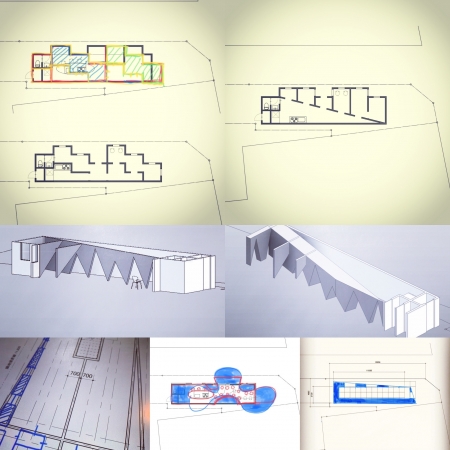持ち込み
空間が相対的なのは、私が見ているモノ、それはすなわち絶対的なモノ、だけで成り立っているのではなくて、私が持っているイメージ、それが相対的なモノ、からも構成されているからで、少しでも相対的なモノが含まれれば、それは絶対的なモノではなくて、相対的なモノになる
相対的であるから、人によって違うモノになる。
絶対的に美しいモノ、絶対的に素晴らしいモノは尊く、なくてはならない存在であり、その美しいという事実、素晴らしいという事実には時間の概念は無く、永遠でいいのだが、それと同時に変わるモノ、無くなるモノにも価値を見出す、それを日本文化特有のモノという人もいるが、ことで成り立つモノをつくるとしたらどうなるか。
絶対的であったり、相対的であったりするのは人に対してだから、人にとって変わるモノ、相対的なモノを持ち込めばいい。それはいろいろとあるかもしれないが、気分というのはどうだろうか、人の気分ほどコロコロ変わるモノはないし、その気分ほど人に影響を与えるモノもないだろう。
気分によって見ているもののイメージが変わる。イメージが変われば、その見ているモノの捉え方も変わる。捉え方が変われば、そのモノに対する人の行動が変わり、その見ているモノが建築や空間ならば、その建築や空間は今までとはちがうモノにならざるを得ない。
では、気分を誘発するモノを建築や空間に持ち込むか。
"Bring in"
Space is not relative to what I see, that is, to what is absolute, but to what I have and what it is. So, if there is any relative thing, it becomes a relative thing, not an absolute thing.
Because it is relative, it will be different for each person.
Absolutely beautiful things, absolutely wonderful things are precious and indispensable beings, and the fact that they are beautiful and wonderful does not have the concept of time, it is forever, but at the same time, the things that change are gone. Some people find value in things, which is unique to Japanese culture, but what happens if we make things that are made up of things?
It is to the person that it is absolute or relative, so it suffices to bring in something that changes for the person, something that is relative. There may be various things, but how do you feel about it? Nothing changes like a person's mood, and nothing affects it as much as that mood.
The image of what you see changes depending on your mood. If the image changes, the way we perceive what we are seeing also changes. If the way of thinking changes, the behavior of people for the thing will change, and if the thing you are looking at is an architecture or a space, that architecture or space will inevitably be a different thing.
Then, do you bring things that induce mood into architecture or space?


